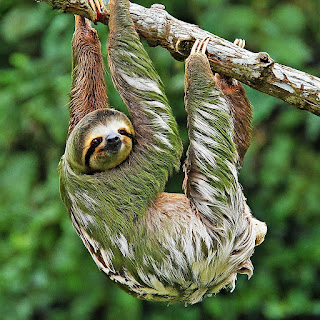Amazing Interesting Funny Sloth of its Kind
 |
| A relaxed sloth hanging upside down from a tree branch, showcasing the slow and steady lifestyle of these unique creatures. |
The sloth is a very strange animal as it has a small head and strong, curved claws.
While in the wilderness the sloths usually sleep during the day. The sloth always is curled up in the fork of a tree or hanging from branches. At night you will find that sloths move about in the tree. This is the time many of the sloths slowly start feeding on leaves, flowers, or fruits.
it is strange to note that the feet of a sloth are curve inward which makes the sloth unable to walk with ease upon the ground and will only climb down a tree only to get to another tree in search of food.
When the sloth is on the ground it shuffles and moves clumsily about on all fours legs or drags itself by its forelimbs across the ground. The main and greatest enemies of sloths are the flying eagles and the dangerous big cats mostly the jaguars.
With little or no protection mechanism at their disposal many sloth attacks take place and as a result, many sloths die due to such vulnerability of being easy prey to some of the dangerous animals of prey. While many sloths breed in the spring some sloths are known to breed throughout the year. The female generally gives birth to one young. cute baby sloth
As far as the types and kinds of sloths are concerned, there are two kinds of sloths. The two distinct kinds of sloth are the three-toed sloth, or ai; and the two-toed sloth, or unau. Its amazing how these beautiful creatures are. You find that these two kinds of sloths have three toes on their hind limbs, but differ in the number of toes on the forelimbs.
The three-toed sloths, strange as they may be also of which there are three species, have small, stumpy tails and a body length of up to about 20 inches . since this is what makes up many of the sloths family and the sloth species as a whole, as far as the two-toed sloths are concerned, there are two species, are tailless and grow up to about 25 inches long. Almost all other mammals have seven vertebrae in their necks, but three-toed sloths have nine and two-toed sloths have six.
Sloths make up the family Bradypodidae. The three-toed sloths make up the genus Bradypus, the two-toed sloths make up the genus Choloepus.
Many people say that sloths have parts which are either too big or too small for them. The Sloths as people picture them have small heads, tiny eyes and ears. While many animals have tall tails to show it off or to ward of insects the sloth has a small tail hidden beneath their fur. You will be amazed to note that as far as the rest of the body is concerned. f its body can be quite large and the arms and legs are powerful, which help with tree climbing.
The fur of the sloth comes in a variety of colors, but is usually bulky and coarse In the wild there is always a relationship between the animals which stay in the same natural habitat whether they are parasites or just other insects which depend on others.
Many of the insects which live on the body of the sloth are mites, ticks and even moths. These insects will just hide on the back of the sloth and feed on it for as long as they can cling to the body or for as long as the fur can be there.
Slow as Molasses: Although the southern two-toed sloth is gray-brown in color, it may be tinged green from the algae growing on its fur. As their name suggests they are slow moving, which may make it easier for insects and plants to find a home on the sloth's body.
Sloths always spend their lives on trees. Just like babes in the woods sloths will only come the ground only to defecate about once a week.
These amazing creatures are just home amazon. Many people have take and adopted sloths as pets. Despite that fact that the number or the population of sloths is coming down, many pet owners have tried to come up with breeding programs and a slight comeback.
Whether this is a good idea to keep sloths at home in cages is just an area where many of the natural requirements for the sloth will just not be met hence a need to properly protect these animals which turn eyes when they move.

No comments:
Post a Comment